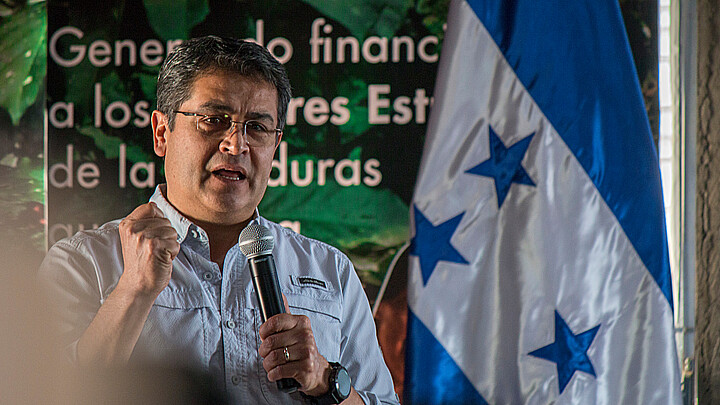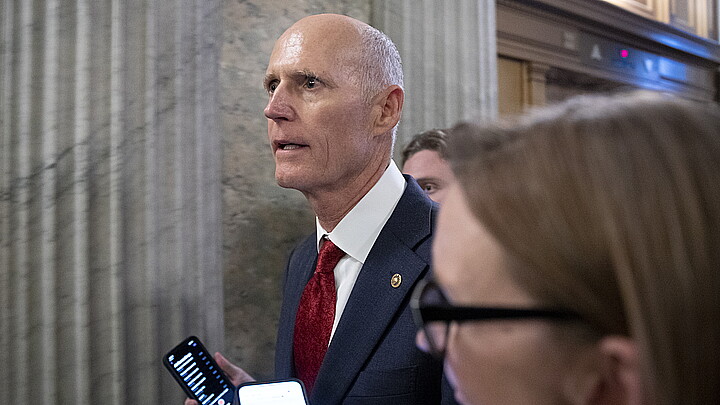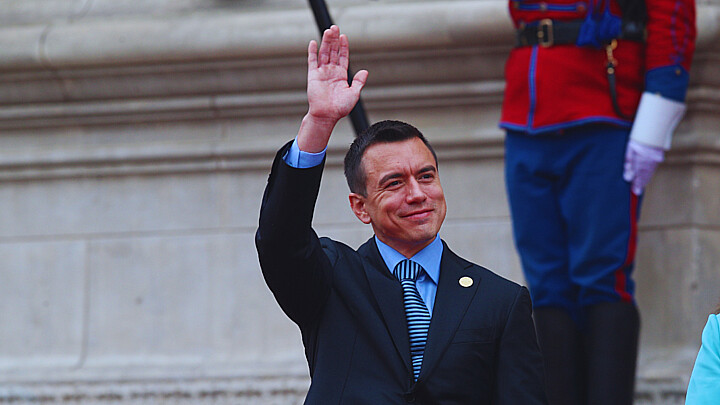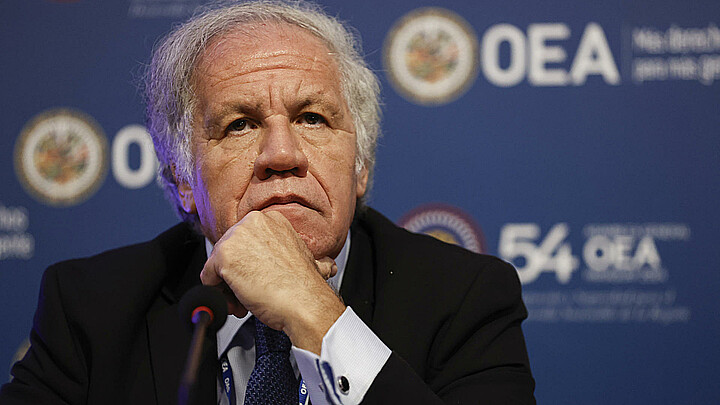Politics
Report: Latin America's 'socialist, authoritarian wave' is inviting hostile regimes into the hemisphere
Latin America's dominos appear to have fallen in the direction of a radicalized, authoritarian left — opening up new opportunities for socialist leaders and their anti-American allies
January 11, 2022 7:02pm
Updated: January 12, 2022 11:52am
A new study from The Center for a Secure Free Society (SFS) warns that “a new socialist, authoritarian wave is rising in the region in 2022” and that “Russia, Iran, and China are capitalizing on these new opportunities.”
Although Ecuador brought hope to proponents of a free society when Guillermo Lasso won the nation’s presidential election, ending 14 years of Correista rule in April of last year, the region’s dominos appear to have since fallen in the direction of a radicalized, authoritarian left — opening up new opportunities for socialist leaders and their anti-American, extra-regional allies.
This has quickly become apparent as newly elected leftist leaders in Nicaragua, Peru and Chile were quick to kiss the ring of their foreign patrons.
Just yesterday, Mohsen Rezaei, one of five Iranians accused of being behind deadly 1994 bombing of a Jewish center in Buenos Aires, was seen attending the inauguration of Daniel Ortega in Managua, Nicaragua.
Rezaei, a former leader of Iran’s paramilitary Revolutionary Guard, is presently wanted by Argentina on an Interpol “Red Notice” for his involvement in the attack that left 85 people dead.
Furthermore, according to the report, “President Pedro Castillo made an irregular visit to Beijing’s embassy in Lima shortly after being inaugurated as Peru’s president. Tehran’s state-sponsored cultural center in Santiago voiced support for Chile’s President-elect Gabriel Boric. And Moscow and Managua strengthened ties on the eve of President Biden’s Summit for Democracy, by welcoming an official Nicaraguan delegation to Moscow that was headed by the two sons of Daniel Ortega and Rosario Murillo.”
But while chatter in Washington once warned of the threat of the VIRUS nations (Venezuela, Iran and Russia) in the region, analysts must now account for the fact that Caracas is no longer the only regime willing to open its borders — and economy — to Tehran and the Kremlin.
Furthermore, Beijing’s involvement in the region must now also be considered.
Iran
It is no secret that the Iranian regime has shown interest in extending its reach into the Western Hemisphere. As early as 2008, experts warned that Tehran was potentially cooperating with the dictatorship of Hugo Chavez in order to bring nuclear weapons that could theoretically reach the United States to the region.
Robert Morgenthau, the then-Manhattan District Attorney, first sounded the alarm bells in a Wall Street Journal op-ed, claiming that “two of the world’s most dangerous regimes… will be acting together in our backyard on the development of nuclear and missile technology.”
Similarly, Peter Brookes, former deputy assistant defense secretary for Asian and Pacific Affairs under President George W. Bush, voiced his concerns in a New York Post op-ed, writing, “Down the road, the concern is that Iran will also share with Venezuela the military dimensions of its nuclear program, such as ballistic-missile and nuke-warhead systems and technology.”
Although the Maduro regime has not yet gained access to nuclear weapons, his ties to Tehran might be considered even stronger than those forged by his predecessor.
A new report from the Israeli Alma Center found that Iranian-made unmanned aerial vehicles (UAVs) are now stationed in Venezuela — approximately 1,200 miles “from skyscrapers in Miami.”
This is of particular note as Iran has, in recent years, unveiled multiple UAVs with ranges of upwards of 1,500 miles.
Maj. Tal Beeri, head of the research department at the defense watchdog located in northern Israel, said the new report shows that Iran's "UAV army" is comprised of “thousands of unmanned systems, which are designed to gather intelligence, and to strike surface or air targets, either by launching missiles and bombs, or conducting a suicide explosive attack by diving into the target.”
The Iranian Supreme Leader Ayatollah Khamenei considers Nicolas Maduro’s regime in Venezuela to be a key ally because it is both anti-American and strategically located. Tehran appears to believe that placing military assets so close to American soil could contribute to its deterrence posture against Washington, helping the U.S. to “think twice” before taking military action against Iran.
Iran has also provided economic and military aid to Venezuela — while also helping Caracas form Popular Mobilization Units (PMUs), a complex aggregation of militias which have historically helped Iran project influence in Iraq and Syria.
“Ultimately, the Iranians have marked out Venezuela as a potential base for some sort of activity against the U.S. in the future,” Beeri noted. “Even if they do not actually act from it, in Iran’s strategic view, merely having a presence there is a threat to the U.S.”
But Maduro’s goal of forging a renewed and stronger relationship with Iran is no secret.
In the coming months, the dictator will head to Tehran for his third official visit and “is expected to sign a 20-year deal between Iran and Venezuela that mirrors the 25-year strategic cooperation agreement between Iran and China inked in 2020,” the SFS report noted.
The upcoming visit was confirmed by Maduro in a Dec. 26 interview with Al-Mayadeen, a pan-Arabist news network based in Lebanon, where Maduro “mentioned the need for Venezuela to strengthen economic ties with the Middle East, and his enduring support for Syria’s Bashar al-Assad and admiration for Iran’s Supreme Leader Ayatollah Ali Khamenei,” the report continues.
But as Tehran’s growing relationship with Chile’s newly-elected President Gabriel Boric — coupled with its ongoing activity in Argentina — signals, Iran’s interaction with Latin America will not be limited to Venezuela.
SFS notes, “While Venezuela will continue to be the base for Iranian operations in Latin America, 2022 will likely see Iran expand its outreach throughout the region, namely with members of the Bolivarian Alliance.”
Russia
Russia’s involvement in the region has been no secret — although it has been widely ignored by mainstream media sources.
When Hugo Chavez took power in 1998, the Kremlin immediately saw an ally in the staunchly anti-American despot. Since then, Russia has sold advanced weapons to Caracas and even sent troops and two Tu-160 bombers — capable of carrying nuclear weapons — to support Maduro’s regime.
But Putin’s ambitions are not limited to Venezuela — or only to socialist nations.
Shortly after Brazil was elected to join the U.N. Security Council, Russian Foreign Minister Sergey Lavrov stated that Brazil’s membership in the United Nations Security Council will create new opportunities for the countries to boost cooperation.
"New possibilities are opening up thanks to the fact that, as of January 1, Brazil will be a member of the UN Security Council, which will add new directions of work to our close partnership," Lavrov said when receiving his Brazilian counterpart, Carlos França, in Moscow.
Similarly, Ecuador’s Foreign Minister Mauricio Montalvo announced in December that President Guillermo Lasso is expected to visit Russia early this year.
"I received Russian Ambassador Vladimir Sprinchan to discuss the next meeting of the [intergovernmental] commission on trade and economic cooperation and preparations for President Guillermo Lasso’s visit to Russia in 2022," Montalvo noted.
But the Kremlin was also quick to capitalize on the new wave of authoritarian elections in the region and the SFS report noted that, “In early December, a Nicaraguan delegation headed by Daniel Ortega and Rosario Murillo’s two sons and Argentine President Alberto Fernandez met with Russian diplomats in Moscow to discuss strengthening relations between the respective countries.”
The report continues to warn that Russia’s ambitions are not strictly political, but rather also have a militaristic angle.
“The country’s efforts to export military hardware around the world have intensified,” the report reads. “Russia’s Military-Industrial Company is already in talks with Uruguay and Venezuela to export armored personnel carriers (APCs) and other armored vehicles. Meanwhile, the Peruvian government put into force an agreement on mutual protection of classified information within its technical-military cooperation with Russia.”
Ultimately, “Latin America’s neo-socialist wave may open up new engagements for Russia in the region, as Moscow shores up support from traditional allies.”
China
China has continued to deepen its engagement in Latin America, and it's now the top trading partner for many of the region's largest economies, giving Beijing considerable leverage in a region historically dominated by the U.S.
In a recent interview with Axios, Ecuador’s ambassador to Washington, Ivonne Baki, warned that the “U.S. is losing Latin America to China without putting up a fight.” Her frustrated interview revealed that without more attention, even “U.S.-friendly countries will conclude that we’re still just the backyard.”
Baki’s words appear to reveal a dangerous truth: even U.S. allies in the region are susceptible to China’s economic imperialism.
According to the SFS report, “this is apparent in a $50 million loan from the Asian Infrastructure Investment Bank (AIIB) to Ecuador and a bilateral forum between Brazil and China to increase cooperation in agricultural biotechnology.”
Beijing could also find an ally in Chile’s Gabriel Boric as he oversees the construction of a 9,000 mile subsea cable to send solar energy to China — forging even deeper ties between the two countries.
China is, after all, already Chile’s top trading partner and is already heavily involved in the country’s booming lithium industry.
Similarly, Cuba recently signed a Belt and Road Initiative deal with China and recently participated in the China International Import Expo, along with delegations from Argentina and Colombia.
According to SFS, “China’s wolf warrior diplomacy with U.S. allies in Latin America comes as it advances its diplomatic onslaught to isolate Taiwan. Prior to seizing the former Taiwanese embassy in Managua, the Ortega-Murillo regime broke Nicaragua’s long-standing diplomatic ties with Taiwan in early December, joining El Salvador, prompting Honduras, and cornering Guatemala in favor of China.”










